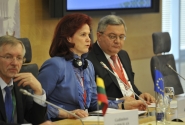
“We, representatives of the European Union national parliaments, have to support the democratisation efforts of Eastern Partnership countries and share our experience with our colleagues. For the European Union to be strong, safe and secure, we have to recognise how important all our neighbours are, whether they are to the south or the east,” said Solvita Āboltiņa, Speaker of the Saeima, on Monday, 7 April, at the Conference of the Speakers of the Parliaments of the European Union held in Vilnius, Lithuania.
Speaker Āboltiņa affirmed that Latvia still strongly supports the strengthening of relations between the European Union and the Eastern Partnership countries. In light of the situation in Ukraine, the most important step forward is signing the political part of the EU – Ukraine Association Agreement, emphasised the Speaker; she also stressed that the EU should be proactive in signing Association Agreements with Georgia and Moldova.
Solvita Āboltiņa citied Robert Schumann, one of the founding fathers of the European Union, who declared that “we must make Europe not only in the interest of the free countries, but also to be able to welcome the people of the East who, freed from the subjection that they have suffered until now, will ask to join us and request our moral support”.
“Robert Schumann said these words just after the events in Hungary in 1956. They applied to Czechoslovakia in 1968, to Poland in the 1980’s, to the Baltic countries in 1991, and they hold true today in Ukraine and elsewhere,” emphasised the Speaker.
“Although in some cases we do not share common borders with the Eastern Partnership countries, we will feel safer if democracy is strong beyond our borders. We have to recognise the fact that the political situation is different in each country. That is why there should be a different approach to each, whilst not losing sight of our common values,” said Solvita Āboltiņa.
The Speaker of the Saeima recalled events over 20 years ago: “Almost a quarter of a century has passed since the fall of the Berlin Wall in 1989 and also since Estonians, Latvians and Lithuanians formed a human chain extending 600 kilometres from Tallinn, through Riga to Vilnius. The Baltic people stood hand in hand, shoulder to shoulder and heart to heart for freedom. However, our freedom did not come for another two years - for us World War II ended only in 1991. Back then our hope was to regain our place among the free European nations, and we see that today our Eastern Partnership colleagues are in the same position.” Speaker Āboltiņa highlighted that some of the Eastern Partnership countries are still plagued by internal struggles, and overcoming the Soviet legacy is often difficult - “however, the road towards democracy cannot be paved with threats or political revenge”.
“The greatest threats to progress for our Eastern Partnership neighbours are not internal but external challenges. Recent political events show that we cannot be indifferent to what is occurring around us. The aggression of the Russian Federation toward Ukraine was unthinkable only a short time ago. The decision by the Russian Federation to sanction the use of armed forces in the territory of Ukraine is a gross violation of international law and direct interference with the domestic affairs of a sovereign state,” indicated Solvita Āboltiņa.
The Speaker of the Saeima, referring to the experience of Soviet oppression shared by many states, stated: “That is why we can say we know our Eastern partners well, and we know their people even better. Today they can see how far Poland or the Baltic States have come. They also want to live in safe, aspiring democracies, striving for prosperity for the people of their countries. We are here to help.”
Solvita Āboltiņa noted that in May Latvia will mark the 10th anniversary of its EU membership and that a decade is a sufficient time to assess our integration in the EU. She attested to Latvia’s readiness to share its experience and know-how with other countries in order to support these countries on their path towards good governance. The Speaker of the Saeima indicated that liberalisation of the visa regime is currently the most tangible benefit of the European integration process for the people of the Eastern Partnership countries because it brings them closer to Europe.
In her address to her colleagues, Speaker Āboltiņa indicated that the Conference is taking place between the Eastern Partnership Summit held in Vilnius and the one planned to be held in Riga. She confirmed that the Eastern Partnership will be among the priorities of Latvia’s presidency of the Council of the European Union; however, it is essential to focus on the Eastern Partnership during this year as well. The Speaker said that is why she is personally trying to involve and support the Eastern Partnership countries. For example, she visited Georgia on an official visit last week in order to meet with David Usupashvili, Speaker of the Georgian parliament, and to discuss Georgia’s future efforts in its movement towards the West. “I was deeply moved by his words - “We feel safer having you as our friends here!”,” said Solvita Āboltiņa.
The Speaker of the Saeima also thanked her Nordic and Baltic colleagues for supporting the initiative to hold the next meeting of the NB8 speakers in Moldova.
The Conference of the Speakers of the Parliaments of the European Union is one of the largest events organised by the Lithuanian parliament after Lithuania’s presidency of the Council of the European Union. This event is attended by 300 representatives of the national parliaments of the European Union, the European Parliament and Eastern Partnership countries. The agenda of the Conference includes topics such as the role of parliaments in tackling the consequences of the economic and financial crisis, five years after coming into force of the Treaty of Lisbon and lessons of subsidiarity checks in parliaments, as well as interparliamentary cooperation in the area of freedom, security and justice.
Saeima Press Service







